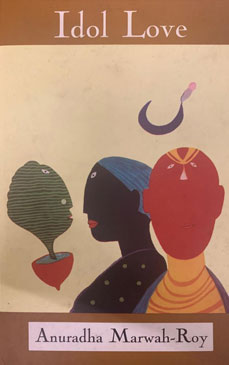Idol Love By Anuradha Marwah
Love is essentially unfair in Idol Love, a novel set in the immediate present and the foreseeable future. There is always a lover and a beloved, a worshipper and an image. Sacerdotal relationships span an age, connecting the untidy, festering Delhi of today with a sickly sweet-smelling Rajdhani, the name of the capital in the twenty-first century.
It all begins when Rajni falls desperately in love with a Ghalib-spouting professor who is set up as the leader of the Secularists after the demolition of a Masjid. He makes impassioned speeches and forms a bond with Rajni during anti-communal demonstrations. Their love-story refuses to end even with death, because in Raminland – the India of the future – everything can be preserved over centuries by faith.
Read More
Reviews
Anuradha Marwah-Roy’s novel, Idol Love (1999) addresses the rise of the Hindu Right. The “Ramins”, as she calls them, in a clever conflation of “Brahmins” and a newly reincarnated deity “Poornaramin” rule over the new-old Raminland in an Indian dystopia reminiscent of Margaret Atwood’s The Handmaid’s Tale. Significantly, it is a strategic use of the Bhagwad Gita that is decisive in converting a “no-win situation” into a landslide victory for the Ramins in the general election. The novel’s female protagonist, an English-educated writer who has been working with a secularist coalition, finds herself co-opted and used by the very forces she had been opposing. By the end of the novel, her voice has been completely silenced and her “karma” defined for her by the state as the “action of dedicating her womb to her race,” her social status based upon her caste and her power to give birth to sons.
- Josna Rege in Colonial Karma: Self, Action and Nation in the Indian English Novel. (New York: Palgrave Macmillan, 2004) p 159.
Anuradha Marwah-Roy’s Idol Love (1999) presents a chilling picture of an Indian dystopia in the twenty-first century.
- Antonia Navarro-Tejero in The Essentials of Literature in English Post-1914
This is an intricately crafted story, and marvelously innovative in the use of English to suggest Indian languages - the author indicates subtle differences between the Hindi spoken by the Dasas and the Urdu of the Drohis without using a single italicized desi word. A novel of ideas, Idol Love is an ambitious risk to take at this moment when fiction by Indian women seems largely to swirl gently around the vicissitudes of quotidian life.
- Nivedita Menon in ‘The Book Review’
It is a modern love story set in contemporary Delhi against the backdrop of the Babri Masjid demolition and has an interesting twist.
- Renu Govil in ‘The Statesman’
Anuradha Marwah Roy’s second novel Idol Love is soaked in the suicidal sadness of unrequited love or alternatively the love of idols in a Hindu state, is shown to be a hypnotist seducing us into false prophecies.
- Manish Chand in ‘The Asian Age’
Anuradha Marwah-Roy is erudite, has a way with words and compels attention.
- Khushwant Singh in ‘The Hindustan Times’


